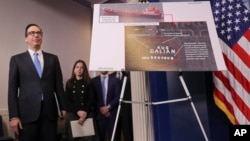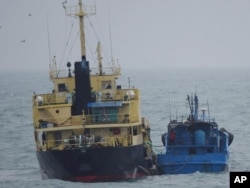The heaviest, the largest, the most impactful — those were the superlatives the Trump administration used to describe its latest sanctions against North Korea.
But were the Treasury Department designations of more than 50 companies and ships accused of illicit trading with the pariah nation really the toughest action yet by the U.S. and the wider world?
Probably not.
Here's a look at how President Donald Trump and a top lieutenant described Friday's sanctions to punish the North for its development of nuclear weapons and ballistic missiles — and how they stack up against past economic restrictions that have been piled on Kim Jong Un's government in response to its illegal weapons tests.
Treasury Secretary Steven Mnuchin: "The Treasury Department is announcing the largest set of sanctions ever imposed in connection with North Korea.''
Trump: "I do want to say, because people have asked, North Korea — we imposed today the heaviest sanctions ever imposed on a country before.''
As for Trump's blanket assertion, in sheer dollar terms, the U.S. has actually imposed much costlier restrictions on countries such as Iran, a far richer economy than North Korea's. Washington and its allies cut off tens of billions of dollars' worth of Iranian oil exports and shut the country's central bank out of the international financial system, among other steps, before eliminating those restrictions under a 2015 nuclear deal.
Correct on number
In terms of the number of entities targeted Friday, Mnuchin is probably correct about the history of sanctions on North Korea.
The department blacklisted "one individual, 27 entities and 28 vessels'' located, registered or flagged in North Korea, China, Singapore, Taiwan, Hong Kong, Marshall Islands, Tanzania, Panama and Comoros. That appeared to be the most companies or individuals designated by the U.S. at a single time. According to Mnuchin, there are now more than 450 U.S. sanctions against North Korea, about half of them levied in the last year.
But in purely economic terms, both Mnuchin and Trump are well wide of the mark.
The latest designations are primarily intended to crack down on North Korea's evasion of wider-ranging sanctions adopted by the U.N. Security Council and the United States that are more economically significant.
Over the past year, the council has adopted three sets of sanctions banning North Korean exports of coal, iron ore, textiles, seafood products and other goods. If those measures are properly implemented, that would reduce the North's export revenues by 90 percent from 2016 levels, or by $2.3 billion annually. Those sanctions are also heavily restricting North Korean fuel supplies. They capped refined oil imports at 500,000 barrels a year. That's a reduction from the 4.5 million barrels North Korea imported in 2016.
It's because of those draconian restrictions that North Korea wants to conduct trade on the quiet with "ship-to-ship'' transfers that the U.S. is determined to stop. With Friday's measures, Mnuchin said, the U.S. has gone after "virtually all their ships that they're using at this moment.''
That's certainly a significant increase in pressure on North Korea as its foreign trade diminishes. But the Treasury Department did not give an overall figure for how much revenue the North would be deprived of because of the latest actions, other than to say that nine of the newly blacklisted foreign vessels "are capable of carrying over $5.5 million worth of coal at a time.''
'Underwhelming' in scope
The conservative-leaning Heritage Foundation did not think much of the new steps.
"As impressive as the list is in length, it is underwhelming in its scope and fails to live up to the hype,'' it said. "Like his predecessors, President Trump remains reluctant to go after Chinese financial entities aiding North Korea's prohibited nuclear and missile programs.''
China is said to account for about 90 percent of North Korea's external trade and be its main access point to the international financial system. Past U.S. sanctions that have targeted Chinese companies have probably had a much bigger impact on North Korea's revenue streams.
In November, the Treasury Department blacklisted three Chinese companies that it said had "cumulatively exported approximately $650 million worth of goods to North Korea and cumulatively imported more than $100 million worth of goods from North Korea.''
An even bigger Chinese trading partner of the North was blacklisted in September 2016: Dandong Hongxiang Industrial Development Co. According to a report by the U.S.-based research group C4AD and South Korea's Asan Institute for Policy Studies, Hongxiang carried out imports and exports worth a total of $532 million in 2011-15. It had also supplied aluminum oxide and other materials that can be used in processing nuclear bomb fuel.





